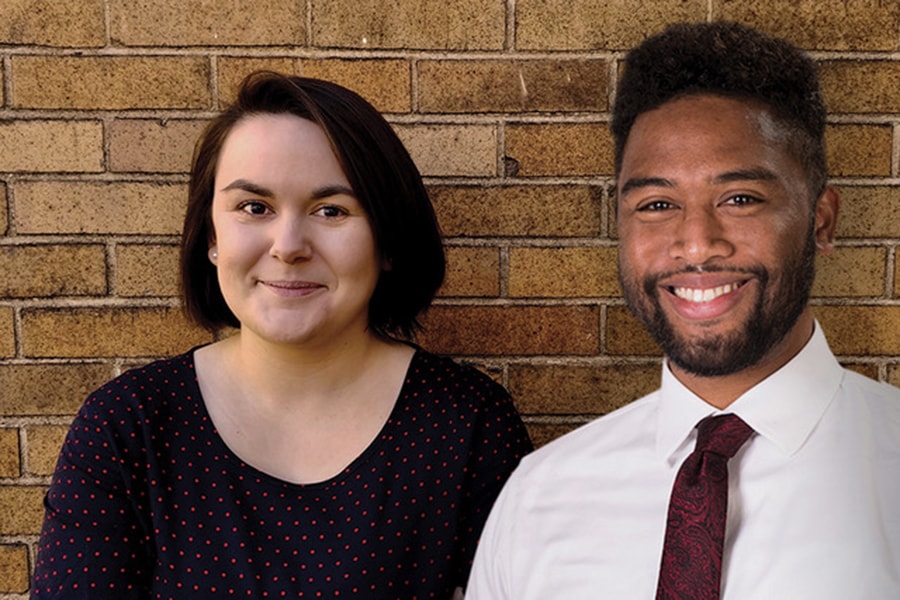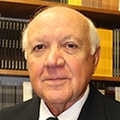
Personal Mention
Aidan Kestigian and Kevin Jarbo are this year's recipients of the Graduate Student Teaching and Service awards, respectively. They will be honored today (April 12) at the Innovation with Impact Exhibition, part of Graduate and Professional Student Appreciation Week.
 Kestigian, a Ph.D. student in the Department of Philosophy, is this year’s Graduate Student Teaching Award winner. Kestigian has been the course instructor for seven philosophy courses including Automation, AI and Society, a new course she independently developed. She is recognized by the faculty for her commitment to develop her teaching skills. She has participated in numerous teaching-focused programs and has presented her pedagogical work at the American Political Science Association Teaching & Learning Conference, the CMU Teaching & Learning Summit and the Technology-Enhanced Learning Summer School. Faculty have praised her natural teaching ability and excellence in the classroom. Students have commended her for her critical thinking skills, her ability to explain concepts and ideas clearly, and her concern for students’ needs.
Kestigian, a Ph.D. student in the Department of Philosophy, is this year’s Graduate Student Teaching Award winner. Kestigian has been the course instructor for seven philosophy courses including Automation, AI and Society, a new course she independently developed. She is recognized by the faculty for her commitment to develop her teaching skills. She has participated in numerous teaching-focused programs and has presented her pedagogical work at the American Political Science Association Teaching & Learning Conference, the CMU Teaching & Learning Summit and the Technology-Enhanced Learning Summer School. Faculty have praised her natural teaching ability and excellence in the classroom. Students have commended her for her critical thinking skills, her ability to explain concepts and ideas clearly, and her concern for students’ needs.
 Jarbo, a Ph.D. student in the Department of Cognitive Psychology, is this year’s Graduate Student Service Award winner for his commitment to science, intellectual community building and meaningful public service. Jarbo, a first-generation American and the first in his family to earn a college degree, is an accomplished scientist. As a research assistant at the University of Pittsburgh, Jarbo has studied brain connectivity in humans and has helped patients with traumatic brain injuries. Since beginning his Ph.D. in 2013 with Assistant Psychology Professor Timothy Verstynen, and as a member of the Center for the Neural Basis of Cognition, Jarbo has explored how different regions of our brain work together to choose behaviors during risky decisions when we have something valuable to lose. His commitment to service is manifested by his desire to apply his knowledge in cognitive science and neuroscience to issues of decision-making in the context of race and social justice. He has organized and led a series of campus discussions about race and privilege, like the Dietrich College Conversation on Race, Community and Marginalization. He is active in the Black Graduate Student Organization and works with the Center for Student Diversity & Inclusion.
Jarbo, a Ph.D. student in the Department of Cognitive Psychology, is this year’s Graduate Student Service Award winner for his commitment to science, intellectual community building and meaningful public service. Jarbo, a first-generation American and the first in his family to earn a college degree, is an accomplished scientist. As a research assistant at the University of Pittsburgh, Jarbo has studied brain connectivity in humans and has helped patients with traumatic brain injuries. Since beginning his Ph.D. in 2013 with Assistant Psychology Professor Timothy Verstynen, and as a member of the Center for the Neural Basis of Cognition, Jarbo has explored how different regions of our brain work together to choose behaviors during risky decisions when we have something valuable to lose. His commitment to service is manifested by his desire to apply his knowledge in cognitive science and neuroscience to issues of decision-making in the context of race and social justice. He has organized and led a series of campus discussions about race and privilege, like the Dietrich College Conversation on Race, Community and Marginalization. He is active in the Black Graduate Student Organization and works with the Center for Student Diversity & Inclusion.
 English Professor and satirist Gerald Costanzo’s new poetry book, “Regular Haunts,” deconstructs a fleeting, popular and consumer American culture. Published by the University of Nebraska Press and part of the Ted Kooser Contemporary Poetry series, “Regular Haunts” contains nearly 30 new poems and a selection of his life’s work. The poems range in topic from life in an exclusive arts and tourist community to a disliked boss who has fallen on hard times. Fifty previous pieces from Costanzo’s more than four-decade career round out the book. Costanzo is the founder of the Carnegie Mellon University Press. Learn more.
English Professor and satirist Gerald Costanzo’s new poetry book, “Regular Haunts,” deconstructs a fleeting, popular and consumer American culture. Published by the University of Nebraska Press and part of the Ted Kooser Contemporary Poetry series, “Regular Haunts” contains nearly 30 new poems and a selection of his life’s work. The poems range in topic from life in an exclusive arts and tourist community to a disliked boss who has fallen on hard times. Fifty previous pieces from Costanzo’s more than four-decade career round out the book. Costanzo is the founder of the Carnegie Mellon University Press. Learn more.
 Gretchen Chapman and a team of researchers examined the scientific findings from research on vaccination behavior and found that the most effective interventions focus directly on shaping patients’ and parents’ behavior instead of trying to change their minds. The findings, published in Psychological Science in the Public Interest, a journal of the Association for Psychological Science, suggest that although vaccination campaigns commonly focus on changing people’s perceptions and attitudes about vaccines, there is little evidence that these campaigns are effective. The researchers found that the most effective vaccination interventions build on favorable intentions, employing behavioral strategies to:
Gretchen Chapman and a team of researchers examined the scientific findings from research on vaccination behavior and found that the most effective interventions focus directly on shaping patients’ and parents’ behavior instead of trying to change their minds. The findings, published in Psychological Science in the Public Interest, a journal of the Association for Psychological Science, suggest that although vaccination campaigns commonly focus on changing people’s perceptions and attitudes about vaccines, there is little evidence that these campaigns are effective. The researchers found that the most effective vaccination interventions build on favorable intentions, employing behavioral strategies to:
- Facilitate action by providing patients with reminders and prompts;
- Reduce barriers by setting default orders and appointments; and
- Shape behavior by developing incentives, sanctions and requirements.
Chapman is a professor in the Department of Social and Decision Sciences. Learn more.
 Kevin Zollman has received the Mellon Foundation New Directions Fellowship, which is designed to enable mid-career scholars to pursue systematic training in areas outside of their specializations. The two-year, $190,000 award will enable Zollman, a philosopher and game theory expert, to study behavioral and complexity economics. Roughly one dozen New Direction Fellowships are awarded each year. Zollman will train with Carnegie Mellon’s world-renowned behavioral economists, who use a unique fusion of economics and psychology to tackle some of the most complicated and costly problems. They include George Loewenstein, a co-founder of the field, Linda Babcock and Saurabh Bhargava, and a network of activities through the Center for Behavioral and Decision Research. Learn more.
Kevin Zollman has received the Mellon Foundation New Directions Fellowship, which is designed to enable mid-career scholars to pursue systematic training in areas outside of their specializations. The two-year, $190,000 award will enable Zollman, a philosopher and game theory expert, to study behavioral and complexity economics. Roughly one dozen New Direction Fellowships are awarded each year. Zollman will train with Carnegie Mellon’s world-renowned behavioral economists, who use a unique fusion of economics and psychology to tackle some of the most complicated and costly problems. They include George Loewenstein, a co-founder of the field, Linda Babcock and Saurabh Bhargava, and a network of activities through the Center for Behavioral and Decision Research. Learn more.
 Casey Roark, a graduate student in the Department of Psychology, was selected as an early career policy ambassador by the Society for Neuroscience. As an early career policy ambassador, Roark traveled to Washington, D.C., on Capitol Hill Day to advocate for an increase in the National Institute of Health (NIH) funding to maintain the research momentum and innovation. Congress has since agreed to increase the NIH funding by $3 billion. “It’s nice to see our advocacy efforts having a direct impact,” Roark said. “It was so fun to tell our research stories and explain why federal funding for our research is crucial to support the work we do and the impact that our work has.” Learn more.
Casey Roark, a graduate student in the Department of Psychology, was selected as an early career policy ambassador by the Society for Neuroscience. As an early career policy ambassador, Roark traveled to Washington, D.C., on Capitol Hill Day to advocate for an increase in the National Institute of Health (NIH) funding to maintain the research momentum and innovation. Congress has since agreed to increase the NIH funding by $3 billion. “It’s nice to see our advocacy efforts having a direct impact,” Roark said. “It was so fun to tell our research stories and explain why federal funding for our research is crucial to support the work we do and the impact that our work has.” Learn more.
